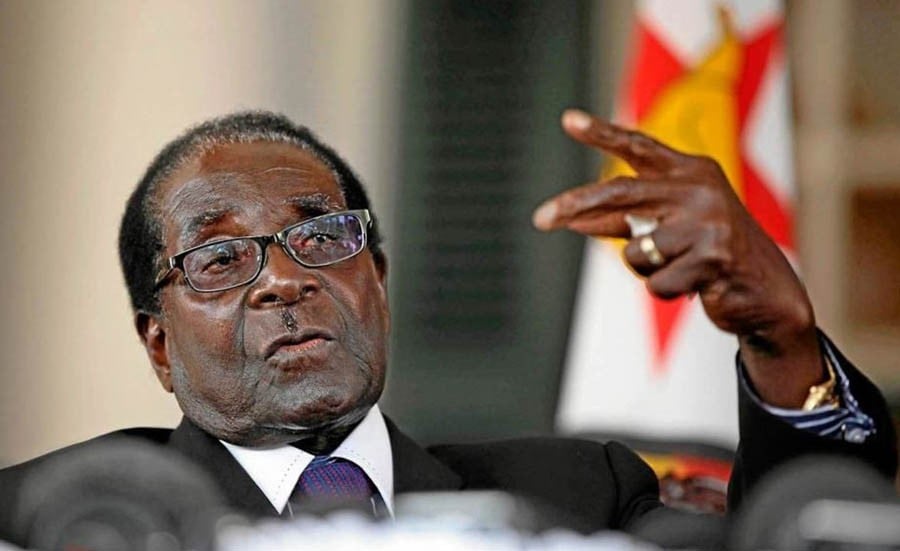
Mugabe has been removed but will that bring in fresh change in Zimbabwe?

The coup in Zimbabwe unfolded like all other coups. The Zimbabwean military moved into the heart of the capital, set up check posts and made a big play of searching all vehicles headed for the airport to nab the fleeing politicians. As usual, the intention of the coup was stoutly denied. The purpose of the military move was dressed up as ensuring the safety of the president, Robert Mugabe, while clearing the allegedly criminal gang gathered around him. The criminal gang referred to was the Generation 40 leaders immersed in the battle to succeed the ailing president. However, within days under the pretense of maintenance of law and order, a full-blown coup was initiated with the arrest of the president and his key lieutenants, and the radio and TV stations seized with troops manning key roads.
The coup came at the head of a long raging succession crisis within the ruling ZANU-PF party. Robert Mugabe, who led Zimbabwe to independence, is one of the longest serving heads of state in Africa. Mugabe rode to power after winning the first election after independence in 1980. Since then he has managed to stay in power through regularly held elections, and a combination of deft political skills and weak opposition.
However, Mugabe’s failing health and old age (he is 93 years old) has led to bitter succession struggle between his wife, Grace, and the old guard of the Zanu-PF party with links to the independence movement. Grace and her supporters in the G40 generation of leaders represent younger leaders with no links to the independence movement.
Robert Mugabe prolonged the succession agony by refusing to name his successor. The office of the vice president, theoretically in line for succession, has been serially vacated, presumably at the instigation of Mugabe’s wife who is seeking the office for herself. Grace was alleged to be behind the sacking of the Vice-President Joice Mujuru, in 2014. The latest crisis erupted when President Mugabe removed his vice president, Emmerson Mnanganwa, on November 4.
Emmerson has been a key loyalist of Mugabe over the years and his enforcer with deep connections to the Zimbabwean military and the old guard of the ZANU-FP. After going into exile following his sacking Emmerson has been cultivating South Africa, China and the military in a bid to oust the ailing president.
The coup, though seemingly reactionary, has been in the making for some time. Media reports have hinted at the chief of the military Constantino Chaweng visiting China prior to the coup with a view to getting Chinese blessings. (China is a key player in Zimbabwean economy and politics since its inception). According to the influential Conversation website, the British government too has been disposed to the idea of working with Emmerson in the event of Mugabe being ousted. This is despite the official reaction of the British government to exercise restraint. China also has not condemned the coup outrightly, signalling its tacit support for the coup. There seems an alliance of the willing Western, Chinese and the regional powers in favour of Mugabe’s ouster.
The ousted vice president has concerted his moves with the new military rulers with whom Emmerson has enjoyed cordial relation due to his occupation of the ministry of defence and security. The South African delegation remains camped in the capital to hammer out details of the post-Mugabe political settlement. The military has so far engaged Robert Mugabe in resignation talks while isolating the Generation 40 leaders, most of whom are detained. Alongside this, the old guard has mobilised the ZANU-PF party base by organising a nation-wide demonstration calling upon Mugabe to step down. The protest was followed by the congress of the ZANU-PF party which removed Mugabe from the president’s position and installed Emmerson in his place, confirming the long-gestating rumours of Emmerson’s succession.
There is also a parallel talk of forming a transitional government with the support of the opposition parties. The widespread expectation that Mugabe will be forced to step down, has come true. President Mugabe is holding out saying the coup is unconstitutional while keeping his line open to the sacked vice president in South Africa. As expected, president Mugabe resigned during impeachment session of the parliament paving way for the succession of Emmerson as president.
Will the removal of Mugabe bring in fresh change? Not necessarily. The fear is that Emmerson represents old wine in new bottle since his association with Mugabe is entrenched and long running. He has been the enforcer and architect of the oppressive state and military apparatus built since Zimbabwean independence.
However, one respect in which he differs from Mugabe is his friendly attitude towards foreign investors. In so far as the military is concerned, it has established its role with this coup. This represents a new negative trend in Zimbabwe which has been a notional democracy since its independence from the British rule. The experience of other coup-prone countries clearly shows that the militaries, once exposed to the attraction of directly ruling the country, do not tend to step back even when democracies are fully established. The notion of a saviour syndrome keeps bugging the coup-happy militaries as shown in the example of Brazil where, at the height of political crisis last year, the military chief floated the possibility of a coup to establish order and normality in the country.
Unhappy becomes the country for ever once it allows its army to intervene in the political process. Whichever way the crisis ends, one thing is clear: Zimbabwe has joined the list of unfortunate countries where the military is set to call shots for a long time to come, distorting the democratic processes established with great care.